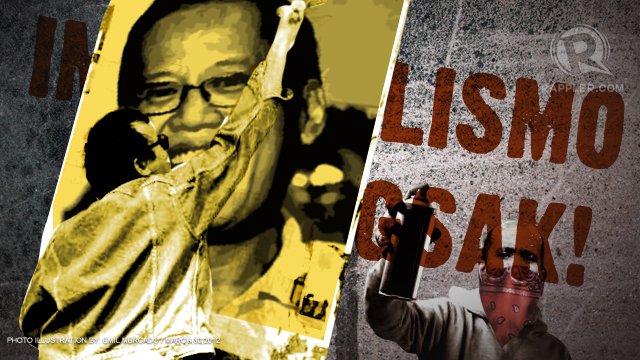SUMMARY
This is AI generated summarization, which may have errors. For context, always refer to the full article.

MANILA, Philippines – If Benigno Aquino Jr ended up toppling the dictator, could it have been possible for Left-leaning activists to coin the word “Ninoying” in the event he failed to fulfill their expectations?
It is inconceivable.
As far as the activists and revolutionaries at the time are concerned, it was the era of “isms,” the 3 basic societal problems: imperialism, feudalism, bureaucrat capitalism. The triumvirate clearly constituted the fundamental problems besetting Philippine society.
To introduce another term to describe a basic social ill would be to tread the path of revisionism, a betrayal of ideology. Not even the fall of a dictator could alter the precise use of the terms — whether in ordinary conversations or chants, in internal documents or leaflets, in poetry or fiction.
And if debates would ensue, they were conducted in plenums and “collectives” lasting until the wee hours of the morning — long and winding, even bitter and deadly, but still highly polemical.
RA vs RJ
Recently, remnants of an old Left debate seemed to resurrect on the Internet.
‘Noynoying’ is [the RAs are] annoying,” wrote Joel Rocamora, a former Left leader.
This generation which is more familiar with Sen Miriam Defensor-Santiago’s “Whah!” is perhaps clueless about allusions to the acronym RA.
Rocamora was referring to a faction of the old Left divide — the “reaffirmists” of the National Democrats or “Natdems.”
In the early 1990s, Communist Party of the Philippines (CPP) chairman Armando Liwanag (believed to be the nom de guerre of the party’s founder, Jose Maria Sison), issued the directive “Reaffirm our Basic Principles and Rectify Errors.” The CPP was reeling from disastrous mistakes such as the policy to boycott the 1986 snap elections, internal purges, and military adventurism. The international communist movement was also in disarray. China and Eastern Europe were starting to embrace capitalism.
The CPP opted to uphold the basic “national democratic” principles, a strand of communist ideology based on Marxism, Leninism, and Mao Tse-tung thought. These included:
1. The class analysis of Philippine society as “semi-feudal” and “semi-colonial” because the country is not industrialized, to begin with.
2. The general line of new democratic revolution that relies on the alliance of the working class and peasants with the view of winning over the middle class.
3. The pursuit of protracted people’s war that entails encircling the cities from the countrysides.
Rocamora was one of those who rejected the CPP’s call, leaving the Party’s political arm, the National Democratic Front of the Philippines (NDFP), to eventually head Akbayan. He belonged to the old bloc called “rejectionists” or RJs. The group has since splintered into various cliques.
A former member of the international group of the NDFP, Rocamora “critically examined the history, the struggle within, and the future of the national democratic movement” in his book “Breaking Through – The Struggle within the Communist Party of the Philippines.”
In assailing “Noynoying,” Rocamora lashed out at Natdems for viewing reforms as “obstacles to the realization of their illusory revolution.”
The enduring armed struggle carried out by the CPP-led New People’s Army, which turned 43 on March 29, has been the very bone of contention for the Left.
Affirming Noynoy
The underground debate cascaded into the legal Left movement, playing out not only in the streets but also in mainstream politics.
National Democrats decided to participate in the party list election in 2001. At present, they have 7 partylist representatives in Congress who form a progressive bloc: Bayan Muna (2), Gabriela Women’s Party (2), Anakpawis (1), Kabataan (1) and Alliance of Concerned Teachers (1).
Meanwhile, Akbayan ran as early as 1998. It has won only 2 seats in the last elections but many of its leaders and members have been appointed to high positions under the Aquino administration.
Now in power, Rocamora, who heads the the National Anti-Poverty Commission, defends President Benigno Aquino III.
“I attend many Cabinet meetings with the President. I can say with full confidence, PNoy is neither lazy nor mentally challenged,” Rocamora attested.
But Renato Reyes of Bagong Alyansang Makabayan (Bayan), the legal umbrella organization of National Democrats, rejected Rocamora’s defense of Aquino.
“Rocamora and his Akbayan friends are having a difficult time seeing anything wrong with the Aquino administration despite the overwhelming evidence staring them in the face,” Reyes said.
“Yakyaktivists”
Marx, Lenin, and Mao used to inspire discourse. These days, it takes a viral tweaked name of a President to spark conversations.
Those were the days when social movements were neither texted nor tweeted. The social network today was the social movement then. The social media today were mass mobilizations then.
In a Twitter tussle, rejectionists countered the affirmists by now calling them “yakyaktivists” (noisy activists).
But Reyes asserted “Noynoying” is not simply a personal attack on Aquino, but rather an assessment of the kind of government that we have today, one that is grossly insensitive to the plight of the Filipino people.
Trending topics are now competing with miltant slogans in captivating social consciousness. Social media is a new arena of ideological struggle. No doubt, the Left does not want to be left out this time around. – Rappler.com
Add a comment
How does this make you feel?
There are no comments yet. Add your comment to start the conversation.